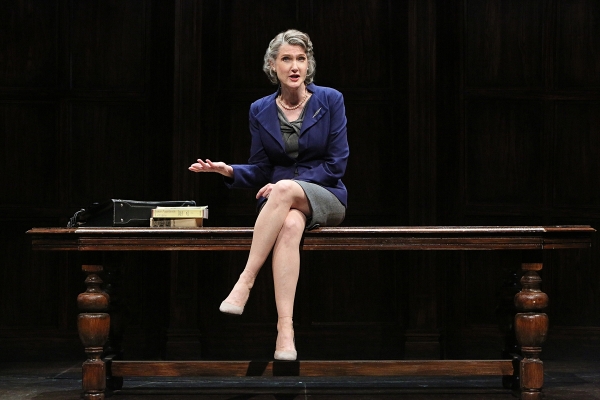Annette O'Toole Joins the Wendy Wasserstein Fan Club as She Takes on Wasserstein's Final Play, Third
Nearly a decade following her tragically premature death, Pulitzer Prize- and Tony-winning playwright Wendy Wasserstein has found an avid fan and admirer in Emmy-nominated actress Annette O'Toole. O'Toole is cutting her teeth on the playwright's sharp prose and prophetic insights as she stars in Wasserstein's final play, Third, at Two River Theater in Red Bank, New Jersey.
Third made its off-Broadway debut at Lincoln Center's Mitzi Newhouse Theater
in 2005, just three years ahead of when the play is set. O'Toole takes on the role of Laurie Jameson, an acclaimed professor with strong political views at a prestigious liberal arts college in New England. In the wake of 9/11 and the subsequent declaration of war in the Middle East, her long-held sense of liberal open-mindedness is tested when she impulsively accuses a student with conflicting political opinions of plagiarism.
O'Toole, best known for her roles in television and film — particularly her role as Martha Kent on the long-running series Smallville — chatted with TheaterMania about jumping into the skin of this onstage character with whom she says she has very little in common. Yet, as her first introduction to Wasserstein's work, she takes on the challenge with an excited fervor, inspired by what she describes as a work of "true genius."

(© Michal Daniel)
Were you familiar with Wendy Wasserstein's work before getting involved with this play?
I never read any of her plays before. They sent [this play] to me and I read it and I was blown away by it. I'm fascinated now by Wendy Wasserstein's life and her work.
What struck you most about this play when you first read it?
It's about so much but it's so concentrated. The scenes are relatively short but she packs so much in. It's just like a little onion you keep peeling back. You keep scratching at it and it keeps giving you a lot, which I think is sort of the sign of true genius. It's very Shakespearean. The language is really beautiful. I'm so in awe of her enormous talent, and now that I know about her very premature death, it's even more of a tragedy. It seemed to me like she was just hitting her stride as a playwright and now we don't get her anymore. This play has not been done very much but I actually think that now is a great time to do it. When it was done originally, it was maybe a little too close [to 9/11], but I think it's such an important play. It's also wonderful to have a part like this for a woman my age. It almost never happens.
Laurie Jameson is someone who has been involved with the shifting tides in politics from the Vietnam War through 9/11. Can you identify with those experiences?
Yes. Not that I was ever a big political person but I lived through it and I certainly have the same leanings that Laurie has. I'm not as outraged [as she is] — although, when this takes place, it's a year after 9/11. It's right as the war was being declared, so her outrage is justified about all that. And now that we all have hindsight we can see how misguided and wrong it all was. [As] somebody who lived through protesting on campuses and burning the bras and doing all those things…I can certainly relate to all that.
Do you relate to other aspects of Laurie's character?
I don't relate to the character almost at all. It's fascinating. I don't think I've ever played a character so removed from me. Some of it's daunting but mostly it's really fun because I trust [our director Michael Cumpsty] so much and because I think the play is so good.
What do you think Wendy Wasserstein would want audiences to take away from this play?
I think it's such a hopeful play. There's a line at the end where I'm doing a lecture about Jane Austen and I talk about the first date with my husband. I say what he said [to Laurie], which was "Most of all, I admire the openness of your heart." I think that everything is leading up to that revelation that she has become a person whose heart is not open [while] she thought she was the most liberal, open-minded, accepting person of them all. [She] changed a whole college and still can't see until that moment that her heart is not open anymore. As set in our ways as we are, as brilliant as a person is, they can be blind to certain things. She quotes the James Taylor song "Country Road." She doesn't know where that road goes, but at least she's open to seeing it.











